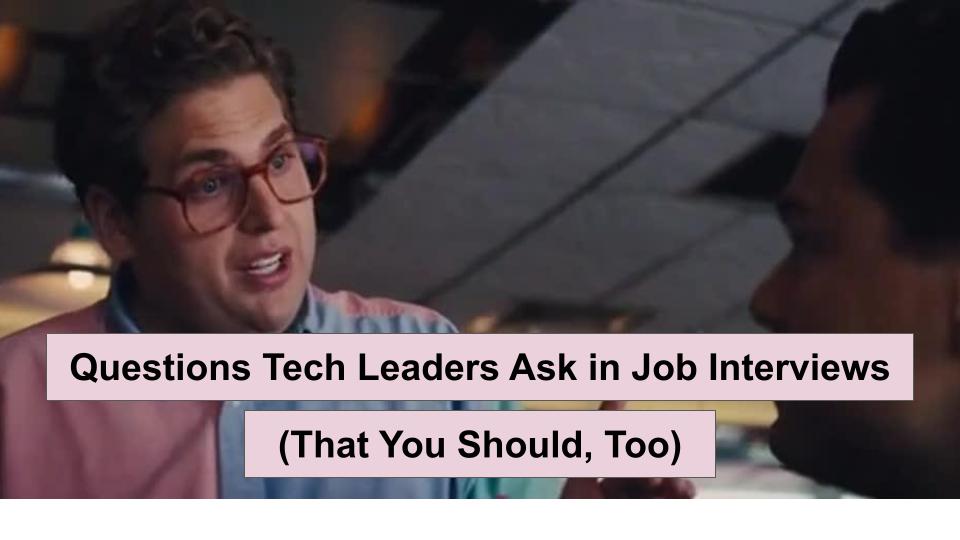Today you’ll learn the exact questions to ask in job interviews, and why to ask them. These are the same questions tech leaders from companies like Slack, Eventbrite, Pinterest, and Atlassian ask. Copy them, win more interviews.
This past quarter we’ve seen staggering layoffs in tech from companies like:
- Coinbase (18%)
- BlockFi (20%)
- Loom (14%)
- OnDeck (33%)
- SoundCloud (20%)
- Robinhood (23%)
- …the list goes on (source)
The bad news? More layoffs are likely.
The good news:
Remote work = an unlimited number of job opportunities.
We are no longer bound by geography or time zone. Remote work transformed the dynamics of finding a new job.
The problem is most people are conditioned to think there’s a limited supply of great jobs. This puts them on the defensive. To be meek in interviews.
The best way to stand out is to have an abundance mindset. Act like there are unlimited jobs out there (because there are) and you can have your pick (you can).
How do tech leaders, at the peak of their careers, do this?
By asking questions most candidates are too nervous to ask.
What they understand: Interviewing is NOT about just getting an offer. Interviewing is about understanding company-fit.
You’re interviewing them as much as they are interviewing you. You won’t learn this with softball questions about “company culture.”
Here’s what you should ask instead:
1/ “Tell me about the company’s KPIs across…”
- Acquisition
- Retention
- Monetization
Red flag: If they only talk about revenue goals. Revenue is an output. What are the inputs generating revenue?
(h/t Elena Verna)
2/ “Tell me more about these metrics:”
For example, if the retention metric is WAU (weekly active user):
- How did you decide on weekly?
- How do you define “active”?
- What other actions did you consider?”
Dig into metric definitions. How did they arrive at them? First principles? Copy a competitor? Draw from a hat?
(h/t Casey Winters and Shaun Clowes)
3/ “How much runway do you have at your current burn?”
- Are you cash flow positive? Profitable? Is there a goal or plan to become either in the near future?
- What is your revenue growth rate this year? Last year?
- What is your current company valuation? What was it last year?
- Do we have valuation multiples of competing companies?
It’s okay to accept more risk by joining a new company. But you want to maximize upside in exchange.
(h/t Buford Taylor and Megan Bianco)
4/ “Tell me about the last planning cycle.”
- How are goals are set?
- How are goals evaluated at EoQ?
- Tell me about a team that missed their goals. What happened?
Dissect the goals you’re measured against. Do you get meaningful input? Or are goals handed-down from on high?
(h/t Brian Balfour)
5/ “How are decisions made?”
- Big decisions? Small decisions?
- What autonomy would you have?
- How do DRIs (Directly Responsible Individuals) get assigned?
What you’re trying to glean: who’s driving decision-making? Data and customer research? Or CEO/leadership?
(There are not necessarily right or wrong answers. But you should know upfront.)
6/ “Who’s been successful at the company?”
- Who’s been promoted?
- What was their trajectory?
- What qualities made them successful?
- Can I speak to them?
Identify the winners. What did they do? Can you follow their playbook?
(h/t Fareed Mosavat)
7/ “What’s the attrition rate out of the company?
- Why did these people leave?
- When company wide issues are identified, how are they communicated to staff?
- Can you give me examples of when management was transparent and put together a thoughtful plan for addressing a problem at hand?
- What are two things that happened for the better to your culture over the past year?
The only wrong answer: trying to cover the warts.
All companies have dysfunctions. Company-fit is finding dysfunctions you can live with.
8/ “Tell me about your typical day”
- How many mtgs with DRs (Direct Reports)?
- How does your team typically collaborate?
- What are the challenges of working remotely? How are you addressing them?
- Tell me about the last time you disagreed with leadership and how did they respond.
One of the worst questions you can: ‘tell me about your company culture.” All you’ll get in return is platitudes and yogababble.
Culture is behavior. Dig into current behavior. It’s the best signal for future behavior.
TL:DR In the face of layoffs and a recession, remote work means more opportunities than ever before.
Use these questions to stand out, demonstrate an abundance mindset, and truly understand a company:
- Tell me about the company’s KPIs
- Tell me more about these metrics
- How much runway do you have at your current burn?
- Tell me about the last planning cycle
- How are decisions made?
- Who’s been successful at the company?
- What’s the attrition rate?
- Tell me about your typical day.
Hope this helps you close interviews and land more job offers.
(Special thanks to Michael Anthony and Felipe Collins for their additional input into these questions.)

1 Comment
Pingback: Land 10+ remote role interviews in 30 days | Christopher Ming Blog